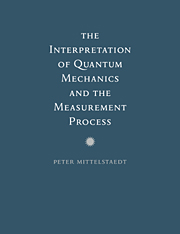4 - The problem of objectification
Published online by Cambridge University Press: 05 November 2009
Summary
The concept of objectification
Weak and strong objectification
Let S be a quantum system that is prepared in a pure state φ and A a discrete nondegenerate observable with eigenvalues ai and eigenstates φai.
If the preparation φ is not an eigenstate of A, then quantum mechanics does not provide any information about the value of the observable A. The pair 〈φ,A〉 merely defines a probability distribution p(φ,ai), the experimental meaning of which is given by the statistical interpretation of quantum mechanics: the real positive number p(φ ai) is the probability of obtaining the result ai after a measurement process of the observable A. This means that if one were to perform a large series of N measurements of this kind, then the relative frequency fN(φ,ai) of the result ai would approach for almost all test series the probability p(φ, ai), for N → ∞ (cf. chapter 3). One could, however, in addition to these well-established results tentatively assume that a certain value ai or even an eigenstate φai of A pertains objectively to the system S but that this value or state is subjectively unknown to the observer, who knows only the probability p(φ, ai) and hence the distribution of possible measurement outcomes. The probability would then express the subjective ignorance (or knowledge) about an objectively decided value or eigenstate of A. The hypothetical attribution of a certain value or eigenstate of A to the system S will be called objectification.
- Type
- Chapter
- Information
- Publisher: Cambridge University PressPrint publication year: 1997



